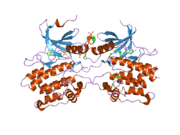DAPK3
| View/Edit Human | View/Edit Mouse |
Death-associated protein kinase 3 is an enzyme that in humans is encoded by the DAPK3 gene.[3][4]
Function
Death-associated protein kinase 3 (DAPK3) induces morphological changes in apoptosis when overexpressed in mammalian cells. These results suggest that DAPK3 may play a role in the induction of apoptosis.[4]
Unlike most other mammalian genes, murine (rat and mouse) DAPK3 has undergone accelerated evolution and diverged from the tightly conserved consensus that is maintained from fish to human.[5]
Interactions
DAPK3 has been shown to interact with PAWR[6] and Death associated protein 6.[6]
References
- ↑ "Human PubMed Reference:".
- ↑ "Mouse PubMed Reference:".
- ↑ Kawai T, Matsumoto M, Takeda K, Sanjo H, Akira S (Mar 1998). "ZIP kinase, a novel serine/threonine kinase which mediates apoptosis". Molecular and Cellular Biology. 18 (3): 1642–51. doi:10.1128/mcb.18.3.1642. PMC 108879
 . PMID 9488481.
. PMID 9488481. - 1 2 "Entrez Gene: DAPK3 death-associated protein kinase 3".
- ↑ Shoval Y, Pietrokovski S, Kimchi A (Oct 2007). "ZIPK: a unique case of murine-specific divergence of a conserved vertebrate gene". PLoS Genetics. 3 (10): 1884–93. doi:10.1371/journal.pgen.0030180. PMC 2041995
 . PMID 17953487.
. PMID 17953487. - 1 2 Kawai T, Akira S, Reed JC (Sep 2003). "ZIP kinase triggers apoptosis from nuclear PML oncogenic domains". Molecular and Cellular Biology. 23 (17): 6174–86. doi:10.1128/MCB.23.17.6174-6186.2003. PMC 180930
 . PMID 12917339.
. PMID 12917339.
Further reading
- Saito T, Seki N, Ohira M, Hayashi A, Kozuma S, Hattori A, Hori T (1998). "Assignment of the ZIP kinase gene to human chromosome 19p13.3 by somatic hybrid analysis and fluorescence in-situ hybridization". Journal of Human Genetics. 43 (3): 209–11. doi:10.1007/s100380050073. PMID 9747039.
- Murata-Hori M, Suizu F, Iwasaki T, Kikuchi A, Hosoya H (May 1999). "ZIP kinase identified as a novel myosin regulatory light chain kinase in HeLa cells". FEBS Letters. 451 (1): 81–4. doi:10.1016/S0014-5793(99)00550-5. PMID 10356987.
- Page G, Lödige I, Kögel D, Scheidtmann KH (Nov 1999). "AATF, a novel transcription factor that interacts with Dlk/ZIP kinase and interferes with apoptosis". FEBS Letters. 462 (1-2): 187–91. doi:10.1016/S0014-5793(99)01529-X. PMID 10580117.
- Page G, Kögel D, Rangnekar V, Scheidtmann KH (Dec 1999). "Interaction partners of Dlk/ZIP kinase: co-expression of Dlk/ZIP kinase and Par-4 results in cytoplasmic retention and apoptosis". Oncogene. 18 (51): 7265–73. doi:10.1038/sj.onc.1203170. PMID 10602480.
- Cariou B, Perdereau D, Cailliau K, Browaeys-Poly E, Béréziat V, Vasseur-Cognet M, Girard J, Burnol AF (Oct 2002). "The adapter protein ZIP binds Grb14 and regulates its inhibitory action on insulin signaling by recruiting protein kinase Czeta". Molecular and Cellular Biology. 22 (20): 6959–70. doi:10.1128/MCB.22.20.6959-6970.2002. PMC 139806
 . PMID 12242277.
. PMID 12242277. - Preuss U, Landsberg G, Scheidtmann KH (Feb 2003). "Novel mitosis-specific phosphorylation of histone H3 at Thr11 mediated by Dlk/ZIP kinase". Nucleic Acids Research. 31 (3): 878–85. doi:10.1093/nar/gkg176. PMC 149197
 . PMID 12560483.
. PMID 12560483. - Kawai T, Akira S, Reed JC (Sep 2003). "ZIP kinase triggers apoptosis from nuclear PML oncogenic domains". Molecular and Cellular Biology. 23 (17): 6174–86. doi:10.1128/MCB.23.17.6174-6186.2003. PMC 180930
 . PMID 12917339.
. PMID 12917339. - Burch LR, Scott M, Pohler E, Meek D, Hupp T (Mar 2004). "Phage-peptide display identifies the interferon-responsive, death-activated protein kinase family as a novel modifier of MDM2 and p21WAF1". Journal of Molecular Biology. 337 (1): 115–28. doi:10.1016/j.jmb.2003.10.081. PMID 15001356.
- Endo A, Surks HK, Mochizuki S, Mochizuki N, Mendelsohn ME (Oct 2004). "Identification and characterization of zipper-interacting protein kinase as the unique vascular smooth muscle myosin phosphatase-associated kinase". The Journal of Biological Chemistry. 279 (40): 42055–61. doi:10.1074/jbc.M403676200. PMID 15292222.
- Schaaf CP, Benzing J, Schmitt T, Erz DH, Tewes M, Bartram CR, Janssen JW (Feb 2005). "Novel interaction partners of the TPR/MET tyrosine kinase". FASEB Journal. 19 (2): 267–9. doi:10.1096/fj.04-1558fje. PMID 15546961.
- Yu H, Jiang D, Guo Z, Saiyin H, Guo J, Wang X, Yu L (Jun 2005). "TCP10L is expressed specifically in spermatogenic cells and binds to death associated protein kinase-3". International Journal of Andrology. 28 (3): 163–70. doi:10.1111/j.1365-2605.2005.00522.x. PMID 15910542.
- Shoval Y, Pietrokovski S, Kimchi A (Oct 2007). "ZIPK: a unique case of murine-specific divergence of a conserved vertebrate gene". PLoS Genetics. 3 (10): 1884–93. doi:10.1371/journal.pgen.0030180. PMC 2041995
 . PMID 17953487.
. PMID 17953487. - Takamoto N, Komatsu S, Komaba S, Niiro N, Ikebe M (Dec 2006). "Novel ZIP kinase isoform lacks leucine zipper". Archives of Biochemistry and Biophysics. 456 (2): 194–203. doi:10.1016/j.abb.2006.09.026. PMC 2758612
 . PMID 17126281.
. PMID 17126281.
This article is issued from Wikipedia - version of the 5/20/2016. The text is available under the Creative Commons Attribution/Share Alike but additional terms may apply for the media files.



